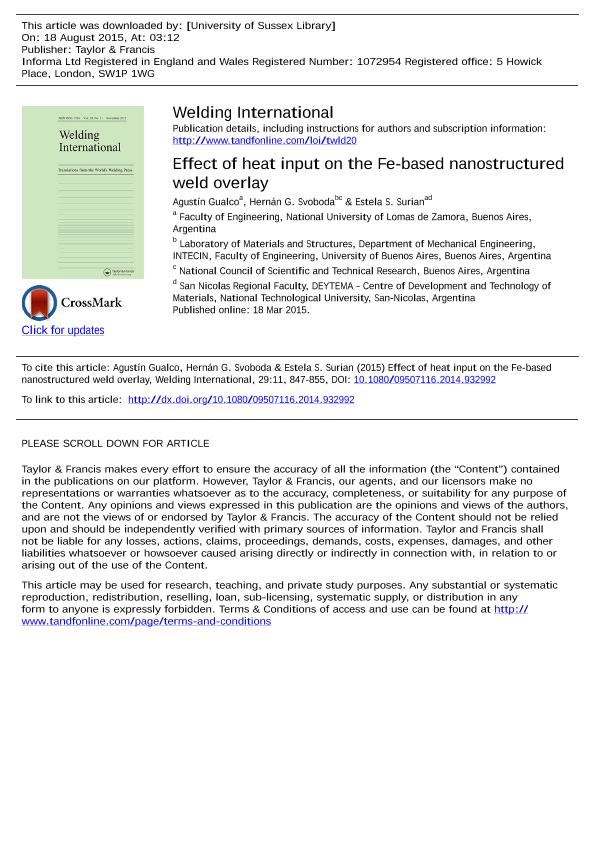Mostrar el registro sencillo del ítem
dc.contributor.author
Gualco, Agustín

dc.contributor.author
Svoboda, Hernán Gabriel

dc.contributor.author
Surian, Estela Silvia

dc.date.available
2017-07-07T19:51:51Z
dc.date.issued
2015-11
dc.identifier.citation
Gualco, Agustín; Svoboda, Hernán Gabriel; Surian, Estela Silvia; Effect of heat input in Fe-based nanostructured weld overlay; Taylor & Francis; Welding International; 29; 11; 11-2015; 847-855
dc.identifier.issn
0950-7116
dc.identifier.uri
http://hdl.handle.net/11336/19897
dc.description.abstract
In the last few years, several welding consumables have been developed that deposit hard iron-based nanostructured alloy coverings with high resistance to abrasive wear. The erosive and abrasive wear resistances are mainly controlled by the chemical composition and the microstructure. In turn, the microstructure of the deposited metal can show variations with the used welding procedure, particularly in relation to the heat input. The operating parameters that define the heat input (voltage, current and welding speed) affect aspects such as bead geometry (wide, penetration and reinforcement) and dilution with the base material. The purpose of this article is to study the effect of heat input on the geometric characteristics of the bead, the dilution and the microstructural evolution of a nanostructured iron-based alloy deposited by FCAW. Several samples with heat input between 0.5 and 3.5 kJ/mm were welded. A dimensional study was carried out for each welded coupon, the chemical composition was analysed and the microstructure was characterized using optical and electronic scanning microscopy and X-ray diffraction. Microhardness, crystallite size and degree of dilution were also measured. Great influence in these conditions in the process was observed about the geometry of the bead. The dilution varied between 30% and 40%; microhardness of the deposit was found between 800 and 870 HV1, and the size of the crystallite varies between 105 and 130 nm, depending on process variables used. The highest hardnesses and the lowest crystallite sizes were obtained with the lowest heat input, associated with a lower dilution.
dc.format
application/pdf
dc.language.iso
eng
dc.publisher
Taylor & Francis

dc.rights
info:eu-repo/semantics/openAccess
dc.rights.uri
https://creativecommons.org/licenses/by-nc-sa/2.5/ar/
dc.subject
Hardfacing
dc.subject
Welding
dc.subject
Nanomaterials
dc.subject
Heat Input
dc.subject
Hard Covering
dc.subject
Microstructure
dc.subject.classification
Ingeniería de los Materiales

dc.subject.classification
Ingeniería de los Materiales

dc.subject.classification
INGENIERÍAS Y TECNOLOGÍAS

dc.title
Effect of heat input in Fe-based nanostructured weld overlay
dc.type
info:eu-repo/semantics/article
dc.type
info:ar-repo/semantics/artículo
dc.type
info:eu-repo/semantics/publishedVersion
dc.date.updated
2017-07-06T18:33:11Z
dc.identifier.eissn
1754-2138
dc.journal.volume
29
dc.journal.number
11
dc.journal.pagination
847-855
dc.journal.pais
Reino Unido

dc.journal.ciudad
Londres
dc.description.fil
Fil: Gualco, Agustín. Universidad Nacional de Lomas de Zamora. Facultad de Ingeniería; Argentina. Consejo Nacional de Investigaciones Científicas y Técnicas; Argentina
dc.description.fil
Fil: Svoboda, Hernán Gabriel. Consejo Nacional de Investigaciones Científicas y Técnicas. Oficina de Coordinación Administrativa Houssay. Instituto de Tecnologías y Ciencias de la Ingeniería "Hilario Fernández Long". Universidad de Buenos Aires. Facultad de Ingeniería. Instituto de Tecnologías y Ciencias de la Ingeniería "Hilario Fernández Long"; Argentina. Universidad de Buenos Aires. Facultad de Ingeniería. Departamento de Construcciones y Estructuras. Laboratorio de Materiales y Estructuras; Argentina
dc.description.fil
Fil: Surian, Estela Silvia. Universidad Nacional de Lomas de Zamora. Facultad de Ingeniería; Argentina. Universidad Tecnológica Nacional. Facultad Regional San Nicolás. Centro para el Desarrollo Tecnológico de Materiales; Argentina
dc.journal.title
Welding International
dc.relation.alternativeid
info:eu-repo/semantics/altIdentifier/url/http://www.tandfonline.com/doi/abs/10.1080/09507116.2014.932992
dc.relation.alternativeid
info:eu-repo/semantics/altIdentifier/doi/http://dx.doi.org/10.1080/09507116.2014.932992
Archivos asociados
